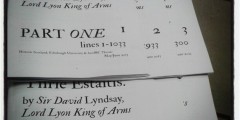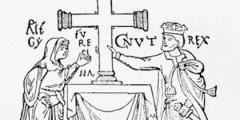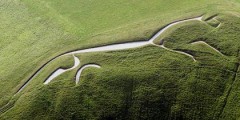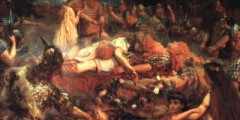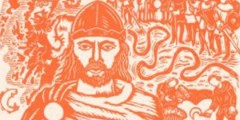The Enduring Past
June 27, 2013
Last Friday the Nottingham Medievalists celebrated the 25th anniversary of our Institute and it was a great opportunity to talk to colleagues and students old and new, but it was especially wonderful to see so many people from outside the university. It is very obvious that medieval matters to many people despite the inaccurate ways …
The drama of good government
June 3, 2013
Next Friday (June 7), I will be attending an extraordinary performance next Friday: an uncut production of Sir David Lyndsay’s Ane Satyre of the Thrie Estaitis at Linlithgow Peel. Ane Satyre is the first surviving play text in Older Scots: it is a personification play, most akin to Mankind , Everyman or even Magnificence. The …
An earlier Iron Lady?
April 10, 2013
Baroness Thatcher is not the only Margaret to have had a significant impact on the history of Scotland. There is Margaret of Denmark, wife of James III, who seems to have kept the peace between her husband and her eldest son, James IV; there is also her daughter-in-law, Margaret Tudor, who provided her great-grandson (through …
Frost and Famine
March 28, 2013
The ongoing cold weather continues to dominate our news. March in Old English is hreðmonað ‘rough/cruel month’ and this March certainly plays up to its medieval title. With a fear of energy shortages we may perhaps understand why winter and early spring were difficult times for our medieval ancestors. Most of the food that had …
Rehabilitating Macbeth
March 21, 2013
Apparently inspired by the exhumation and identification of Richard III, there has been a call from a Member of the Scottish Parliament to re-examine and revise the Shakespearian view of Macbeth. This has provoked all kinds of comment, some of which you can see here http://www.bbc.co.uk/news/uk-scotland-scotland-politics-21421001, here http://www.bbc.co.uk/news/uk-21483159 and here http://www.guardian.co.uk/commentisfree/2013/feb/15/rehabilitate-macbeth-scotland-shakespeare?INTCMP=SRCH. That the Shakespearian image …
Deadly companions: a world without antibiotics
March 18, 2013
In the wake of headlines telling us about the imminent threat of antibiotic resistance I had to think about my own research on the impact of epidemics on early medieval societies. The medieval period can clearly show us what a world without effective antibiotics could be like. When the Middle Ages are portrayed in popular …
The Jewel in the Crown
March 4, 2013
The recent public outcry about Hilary Mantel’s observations regarding the Duchess of Cambridge remind me that it is often Queens, not Kings that fire our imagination.[1] One of these women whose story needs telling again is that of Emma/ Ælfgifu, a woman with quirks, oddities and a lot of character. Unfortunately Mantel has not yet …
Horses for courses?
February 14, 2013
Horses for Courses? With horse meat being big news I had to think back on my own PhD which was all about food and drink in Anglo-Saxon England. If there is one thing certain in medieval times, it is that people most definitely knew where their food was coming from. Other than luxury goods, such …
Viking ancestors: fact and fiction
February 11, 2013
With racism in the news it is perhaps time to look at one of the most persisting misconceptions about the Vikings: that they were actually a ‘race’. There is nothing ‘ethnic’ about the Vikings and they would have been perplexed to be defined thus. The idea that there is something ‘racial’ about Vikings is often …
What books reveal about us
If, for some unimaginable reason, all that remained of the culture of 2012 in 2512 was a battered and annotated copy of Fifty Shades of Grey, a printed programme of the Olympic Games, and video footage of Have I Got News for You?, what conclusions about us would our descendants reach, and how would they …


